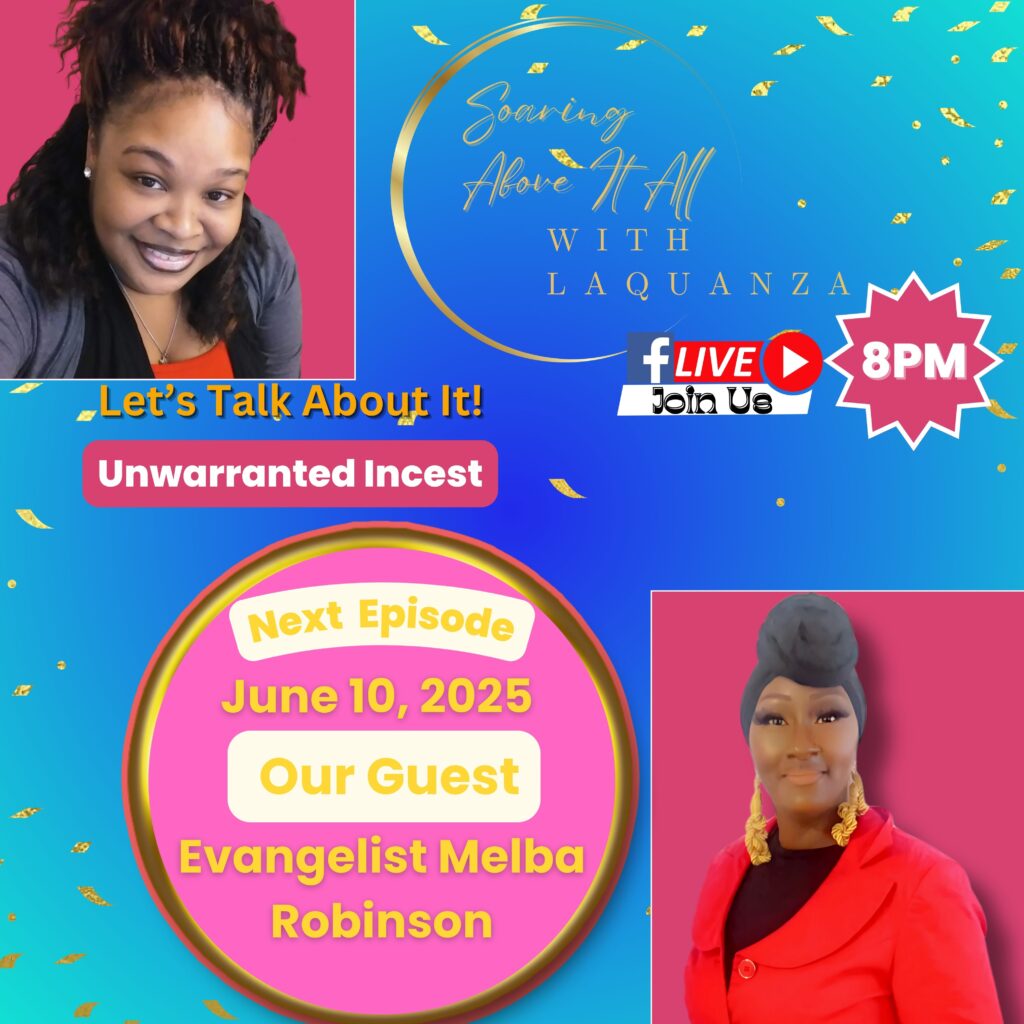Soaring Above It All Blog

Unwarranted Incest — A Conversation with Evangelist Melba Robinson (Part 1)
Soaring Above It All Blog
Join us every second Tuesday of the month for real, raw, and restorative conversations that speak to the heart.
This post recaps Part 1 of our June 10, 2025, episode, aired at 8:00 PM.
Last Tuesday, we were blessed to have Evangelist Melba Robinson join us to share some of her powerful testimony—real life experiences that shaped who she is today.
The episode was titled “Unwarranted Incest,” and Melba was honest, vulnerable, and spirit-led in how she shared the layers of her story.
She began by sharing with us her childhood experiences. Melba was born to great parents and raised in a military family. As an Army brat, she traveled often, and she had a special bond with her sister. They loved playing together as kids. With a smile, Melba said, “I was a prissy little girl.”
Even with all she’s been through, she reminded us:
“All things were not bad.”
“We had good times too.”
That statement is so important. We need to remember that life can hold both joy and pain—and God is present in both.
A Battle: Trichotillomania
As a young child, Melba was diagnosed with Trichotillomania (pronounced trick-oh-till-oh-MAY-nee-uh), a mental health condition that causes an overwhelming urge to pull out one’s own hair—usually from the scalp, eyebrows, or eyelashes.
It’s not simply a bad habit. Trichotillomania is a body-focused repetitive behavior (BFRB) and often a response to emotional distress or trauma.
For Melba, it became a soothing mechanism—a way to numb herself when she felt overwhelmed or helpless. She explained that she’s a natural problem solver, and when she couldn’t “fix” something in her life, that frustration would trigger the pulling behavior.
Is Trichotillomania a Trauma Response?
Yes, it can be.
While not always rooted in trauma, it’s often linked to:
- Stress and anxiety
- Emotional overwhelm
- Past trauma or loss
- The need to regain control
For some, the act of pulling hair becomes a self-soothing behavior—similar to other compulsive actions people use to cope with deep, unresolved pain.
How It’s Diagnosed and Treated
Trichotillomania is classified under Obsessive-Compulsive and Related Disorders in the DSM-5. Key symptoms include:
- Repetitive hair pulling that causes noticeable hair loss
- Repeated attempts to stop or control the behavior
- Significant emotional distress or impairment in daily life
Treatment options may include:
- Cognitive Behavioral Therapy (CBT)
- Habit Reversal Training (HRT)
- Medication (such as antidepressants or anti-anxiety prescriptions)
- Support groups or Christian counseling
Compassion Through Experience
Melba shared that, because of her past, she has developed a deep compassion for people who cope in different ways—through drugs, alcohol, or destructive behaviors. She understands what it means to be hurting and just trying to survive.
She also spoke about how her innocence was taken, and in her later years, she discovered that unseen anger had been buried inside her for a long time.
One of the most powerful things she said:
“Sometimes we self-punish by hurting ourselves more than anyone else ever could.”
Let that sit with you for a minute. How many of us are walking around with silent pain, responding to past wounds in ways we haven’t even named yet?
✍🏽 Journal Prompts to Help You Reflect
- What parts of my story have I tried to numb, hide, or ignore?
- In what ways have I punished myself for things that were never my fault?
- How have I been coping—silently or visibly—with unresolved pain?
- What would healing look like for me if I permitted myself to start?
📖 Scripture & Truth from Melba’s Story
- “The Lord is close to the brokenhearted and saves those who are crushed in spirit.” — Psalm 34:18
- “He heals the brokenhearted and binds up their wounds.” — Psalm 147:3
- “You intended to harm me, but God intended it for good.” — Genesis 50:20
🎧 Replay Available On facebook
You’ll be able to rewatch this powerful conversation on Facebook or then on YouTube June 30, 2025. Stay tuned for the replay link and share it with someone who needs to hear it.
💬 Let’s Continue the Conversation
Has Evangelist Melba’s story touched a part of your heart? Leave a comment below with your thoughts or share your own moment of breakthrough. You never know who might be encouraged by your words.
Leave a Reply